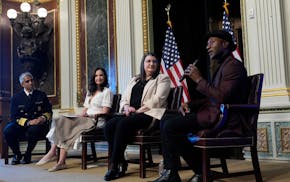When a princess is crowned the queen in fairy tales, it's "happily ever after." Not so in real life. When Elizabeth II of England became queen at 27, it was a seismic shock. How inheriting the throne affected her and her loved ones is the story of "The Crown," streaming on Netflix.
Creator and co-writer Peter Morgan also scripted the film "The Queen," which starred Helen Mirren as an older Elizabeth. This time Claire Foy plays the shy young woman who became Britain's longest reigning monarch.
"Our story starts with her assuming, quite reasonably, that she has a long time before her father will die," Morgan said. "George VI [her father] died at age 56, and I think the Windsors have a tradition of living a long time. I think she could quite reasonably have expected 20, maybe 30, years as a young woman married to a young naval officer, and for Prince Philip to have [his] career, and for them to live somewhat out of the public eye in Malta. And that story of the crown landing in her lap or on her head way sooner than she ever imagined is the essential narrative of the first season," which consists of 10 hourlong episodes.
Her new royal status had a terrible impact on her "and on all her relationships — with her husband, with her sister, with her mother," Morgan said. "We all imagine it's a fairy tale. It's anything but."
Foy ("Wolfe Hall," "Upstairs, Downstairs") views the young queen as conflicted and confused. "The right thing and the thing that you want to do are two very, very different things, I think, for her.
"And her instinct is very much at the beginning [about] family and her love and her husband and her children, and I think she's realizing that that's not necessarily what her job is. And the acceptance of that job, it's a very difficult thing to have to deal with while also grieving for the loss of your father."
Are the real royals aware Morgan and the others are tinkering with their lives? They're aware, he said, but have not been consulted.
"Through untraceable back channels, countless approaches have been made," he said. "And in a way, that protects both sides. I want my independence, and I'm sure they want their independence. There is a sense that they are both very, very nervous and very, very excited. I think they don't like not having control, but I think they also understand that dealing with this subject matter with some degree of respect, even objective scrutiny, is a rare thing.
"These are people who are used to slander, cartoons, satire. These are not people who are used to being taken seriously.
"And whilst that might be a terrifying prospect, I think it is also the only worthwhile way of looking at our recent history."
Foy found it difficult to research the personal side of the queen, who rarely speaks in public about herself. "Emotionally, I just sort of had to imagine what it's like being a girl who wanted to live in the countryside with her husband and have horses and dogs and children, and who was a shy, retiring sort of type."
She was "very close to her lovely sister, who was sort of the opposite, vivacious and full of energy. And suddenly, she's given the top job in a weird way, and she's the most unlikely person to have it, and what that means dynamically in the family and in a marriage and all those sorts of things. But essentially, I just think she's a very, very, very good, good, good person who has given her life for her country, and has done the most incredible job."

Photographer alleges he was forced to watch Megan Thee Stallion have sex and was unfairly fired
Phish fans are famously dedicated. What happens when they enter the Sphere?
Minneapolis will bid to host Sundance Film Festival

Icehouse on Eat Street in Mpls. facing eviction for unpaid rent
